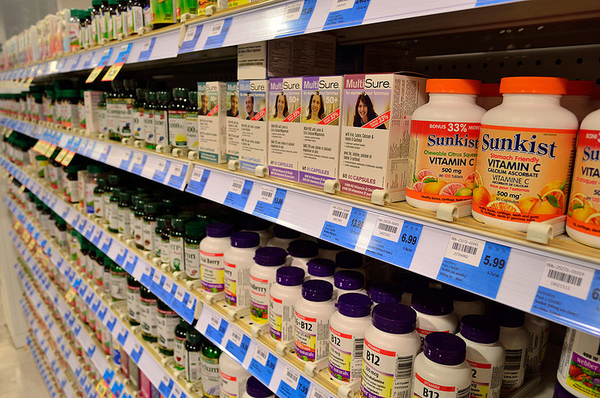
Given the lax regulation of dietary supplements, experts agreed there are ways consumers can protect themselves from dangerous dietary supplements.
First step: Consult a medical doctor.
Physicians should generally recommend supplements to address specific nutrient deficiencies, such as fish oil for people with high cholesterol, folic acid for pregnant women or Vitamin D for people with bone deficiencies, medical specialists and registered dieticians interviewed for this article advised.
“I always tell people that there’s definitely a time and a place for supplements,” said Sunnie DeLano, a registered dietician and professor of nutritional science at Pepperdine.
If blood tests show that a patient is deficient in a vitamin or mineral, then supplements can be beneficial, DeLano said.
“But if you have everything you need … then a supplement is only being wasted because we can only absorb so much at one time and so we typically we’ll just build up the level in our tissues or we’ll urinate them out,” DeLano said.
A Pepp Post survey of 53 Pepperdine University students found that while 75% purchased a dietary supplement in the last year, only 28% said they had taken a dietary supplement based on a doctor’s recommendation. The most commonly prescribed supplements were Vitamin C and Iron.
“Pepperdine students would rarely fall into categories for dietary supplementation due to age and health status,” said Susan Edgar Helm, a registered dietician nutritionist and Pepperdine nutritional science professor.
Don’t try to treat, cure or prevent disease
Consumers should also avoid “purchasing products that claim to prevent, treat or cure diseases without any proof they will work,” according to a February 2019 FDA statement.
“If somebody has a health condition that they’re trying to self-treat or self-manage with dietary supplements, although the dietary supplement may not hurt them directly, it could be harmful by delaying more appropriate treatment,” said Lise Alschuler, naturopathic doctor and professor of Clinical Medicine at the University of Arizona Andrew Weil Center for Integrative Medicine.
This has become especially important with the advent of COVID-19, as supplements have appeared claiming to cure the virus. Companies which tout dietary supplements, including colloidal silver, that claim to treat, prevent or cure diseases like COVID-19 are in violation of FDA regulations, and may be putting people at risk, the FDA warned in a March 9 statement.
Beware of marketing and a “quick fix”
If a medical professional recommends using a dietary supplement, consumers still need to be careful which they choose. Some companies have contaminated or ineffective ingredients. Others use branding and marketing to upcharge for basic ingredients available in any drugstore brand.
Social media users should watch out for dietary supplements with trendy marketing and influencer credibility. The Business Insider’s Erin Brodwin specifically cautioned against Instagram darling, Ritual, which costs $30 for a month’s supply but has the same ingredients and dosages as cheaper multivitamins available at big box stores.

Another branding buzzword consumers need to be wary of is “natural.”
“People should know that natural doesn’t always mean safe … mushrooms aren’t always safe … too much Vitamin A while pregnant can lead to birth defects,” said Carol Haggans, a registered dietitian and scientific and health communications consultant in the Office of Dietary Supplements at the National Institutes of Health.
“That natural thing” is a con that has been around for hundreds of years, and the lack of regulation allows the products with the best marketing to exploit the fears and desires of gullible consumers who believe that anything natural is safe, said Steven Novella, a medical doctor and neurology professor at Yale School of Medicine and editor of the website Science Based Medicine,
Novella’s response to those who argue CBD and Kratom are safe because they are natural: “so is arsenic.”
Products that claim to contain “maximum doses” or “extreme levels” of certain ingredients should also be avoided as “too much of a good thing” isn’t always good, Haggans said.
Consumers also need to distance themselves from the “quick fix” mentality.
“If it sounds too good to be true, it probably is,” Haggans said.
Experts advised consumers to have more reasonable expectations for dietary supplements and their own bodies.
“Stay away from big, audacious claims,” Alschuler said. “‘This is gonna help you lose 20 pounds of weight in two weeks.’ Things like that are generally not how dietary supplements work; they tend to support the body’s natural healing processes. The body doesn’t change fast generally speaking.”
Claims such as “works better than [a prescription drug],” “totally safe,” or “no side effects” are also red flags, Lindsay Haake, FDA health communication specialist, wrote.
Haggans warned against slogans that claim, “the pharmaceutical industry doesn’t want you to know,” about a certain dietary supplement.
Do some research and choose reputable brands
To protect themselves further, consumers can consult the FDA’s Dietary Supplement Ingredient Advisory List before purchasing dietary supplements or vitamins. DeLano and Alschuler also recommend checking dietary supplements through independent testing agencies like ConsumerLab, U.S. Pharmacopeia, NSF and Informed Choice.
DeLano said companies like USP and Informed Choice actually audit supplement manufacturers and test the products to ensure accuracy, effectiveness and safety, as well as adherence to good manufacturing standards at or higher than the required FDA levels. She also recommended WADA (World Anti-Doping Agency), which is geared toward helping athletes specifically understand which dietary supplements they can or cannot take.
While Consumer Labs requires a subscription, DeLano and others believe that the price is worth it for consumers to protect their health.
Consumers can also reference PubMed, where the Office of Dietary Supplements publishes research on dietary supplements among other national and international health concerns, Haggans said.
Consumers should also look to known brands sold in larger retailers rather than online.
“There’s a pretty good level of safety if you’re going toward what I would call like the known brands, so for instance like Nature’s Edge,” DeLano said. “[It] has a variety of different supplements, it has the USP, it’s a big company, they do not want a bad name, they’re on the up and up.”
Report
Consumers should report any adverse reactions to or issues with the quality or safety of vitamins and dietary supplements through the FDA’s MedWatch program, Haake wrote.
If consumers start taking something and “feel weird,” they should talk to their doctors and file an adverse event report right away, Haggans recommended.
Yasmin Kazeminy completed the reporting for this story in Jour 490 in Spring 2020 under the supervision of Dr. Christina Littlefield.




